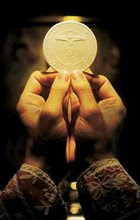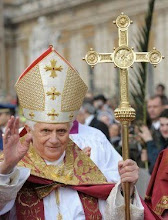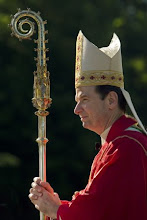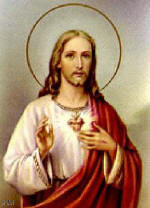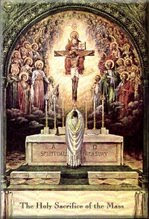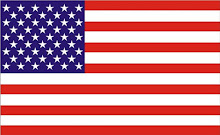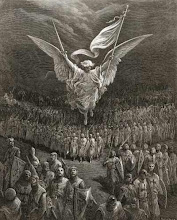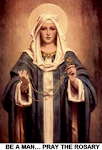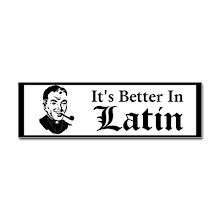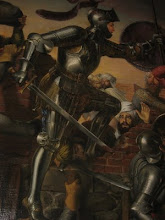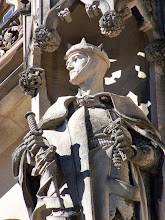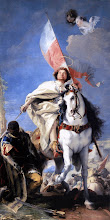Visor lift to Rorate Caeli:
In all sincerity, do you find that the rite of St. Pius V ensures greater solemnity, spirituality, and mystery at Mass?
"I think, then, that the Mass of St. Pius V is one that really looks toward God, and, compared to the Novus Ordo, it seems to me more complete from the point of view of the prayers.”
Read More
Friday, December 31, 2010
Monday, December 20, 2010
Worthy to Receive the Lamb: Catholics in Political Life and the Reception of Holy Communion
by Bishop Robert J. Baker, Archbishop John F. Donoghue, Bishop Peter J. Jugis:
As bishops, we have the obligation to teach and guide the Catholic Faithful whom we shepherd in the Body of Christ. A fundamental teaching of our Church is respect for the sacred gift of life. This teaching flows from the Natural Law and from Divine Revelation.
Life is a gift bestowed upon us by God, a truth underscored by the commandment: "You shall not kill" (Deut 5: 17). The Old Testament also teaches us that human life in the womb is precious to God: "...I formed you in the womb..." (Jer 1: 5). The right to life is a value "which no individual, no majority and no State can ever create, modify or destroy, but must only acknowledge, respect and promote" (Pope John Paul II, Evangelium vitae, 71a). A law, therefore, which legitimizes the direct killing of innocent human beings through abortion is intrinsically unjust, since it is directly opposed to the natural law, to God's revealed commandments, and to the consequent right of every individual to possess life, from the moment of conception to the moment of natural death.
Catholics in political life have the responsibility to exemplify in their public service this teaching of the Church, and to work for the protection of all innocent life. There can be no contradiction between the values bestowed by Baptism and the Catholic Faith, and the public expression of those values. Catholic public officials who consistently support abortion on demand are cooperating with evil in a public manner. By supporting pro-abortion legislation they participate in manifest grave sin, a condition which excludes them from admission to Holy Communion as long as they persist in the pro-abortion stance (cf. Canon 915).
Holy Communion is where Catholics meet as a family in Christ, united by a common faith. Every Catholic is responsible for being properly prepared for this profound union with Christ. Participation in Holy Communion requires certain dispositions on the part of the communicant, namely, perseverance in the life of grace, and communion in the faith of the Church, in the sacraments, and in the hierarchical order of the Church (Pope John Paul II, Ecclesia de Eucharistia, 35-38).
The Church also recognizes that there is a manifest lack of a proper disposition for Holy Communion in those whose outward conduct is "seriously, clearly, and steadfastly contrary" to the Church's moral teaching (Ecclesia de Eucharistia, 37b). A manifest lack of proper disposition for Holy Communion is found to be present in those who consistently support pro-abortion legislation. Because support for pro-abortion legislation is gravely sinful, such persons should not be admitted to Holy Communion.
We also take this opportunity to address all Catholics whose beliefs and conduct do not correspond to the Gospel and to Church teaching. To receive the great gift of God - the Body, Blood, Soul and Divinity of our Lord Jesus Christ - we must approach Holy Communion free from mortal sin. Those who are conscious of being in a state of grave sin should avail themselves of the Sacrament of Reconciliation before coming to Holy Communion. To partake of the Eucharist is to partake of Christ Himself, and to enter into sacramental communion with our Lord we must all be properly disposed.
Because of the influence that Catholics in public life have on the conduct of our daily lives and on the formation of our nation's future, we declare that Catholics serving in public life espousing positions contrary to the teaching of the Church on the sanctity and inviolability of human life, especially those running for or elected to public office are not to be admitted to Holy Communion in any Catholic church within our jurisdictions: the Archdiocese of Atlanta, the Dioceses of Charleston and Charlotte. Only after reconciliation with the Church has occurred, with the knowledge and consent of the local bishop, and public disavowal of former support for procured abortion, will the individual be permitted to approach the Sacrament of the Holy Eucharist.
We undertake this action to safeguard the sacred dignity of the Most Holy Sacrament of the Altar, to reassure the faithful, and to save sinners.
Most Reverend John F. Donoghue Archbishop of Atlanta
Most Reverend Robert J. Baker Bishop of Charleston
Most Reverend Peter J. Jugis Bishop of Charlotte
This item 6095 digitally provided courtesy of CatholicCulture.org
As bishops, we have the obligation to teach and guide the Catholic Faithful whom we shepherd in the Body of Christ. A fundamental teaching of our Church is respect for the sacred gift of life. This teaching flows from the Natural Law and from Divine Revelation.
Life is a gift bestowed upon us by God, a truth underscored by the commandment: "You shall not kill" (Deut 5: 17). The Old Testament also teaches us that human life in the womb is precious to God: "...I formed you in the womb..." (Jer 1: 5). The right to life is a value "which no individual, no majority and no State can ever create, modify or destroy, but must only acknowledge, respect and promote" (Pope John Paul II, Evangelium vitae, 71a). A law, therefore, which legitimizes the direct killing of innocent human beings through abortion is intrinsically unjust, since it is directly opposed to the natural law, to God's revealed commandments, and to the consequent right of every individual to possess life, from the moment of conception to the moment of natural death.
Catholics in political life have the responsibility to exemplify in their public service this teaching of the Church, and to work for the protection of all innocent life. There can be no contradiction between the values bestowed by Baptism and the Catholic Faith, and the public expression of those values. Catholic public officials who consistently support abortion on demand are cooperating with evil in a public manner. By supporting pro-abortion legislation they participate in manifest grave sin, a condition which excludes them from admission to Holy Communion as long as they persist in the pro-abortion stance (cf. Canon 915).
Holy Communion is where Catholics meet as a family in Christ, united by a common faith. Every Catholic is responsible for being properly prepared for this profound union with Christ. Participation in Holy Communion requires certain dispositions on the part of the communicant, namely, perseverance in the life of grace, and communion in the faith of the Church, in the sacraments, and in the hierarchical order of the Church (Pope John Paul II, Ecclesia de Eucharistia, 35-38).
The Church also recognizes that there is a manifest lack of a proper disposition for Holy Communion in those whose outward conduct is "seriously, clearly, and steadfastly contrary" to the Church's moral teaching (Ecclesia de Eucharistia, 37b). A manifest lack of proper disposition for Holy Communion is found to be present in those who consistently support pro-abortion legislation. Because support for pro-abortion legislation is gravely sinful, such persons should not be admitted to Holy Communion.
We also take this opportunity to address all Catholics whose beliefs and conduct do not correspond to the Gospel and to Church teaching. To receive the great gift of God - the Body, Blood, Soul and Divinity of our Lord Jesus Christ - we must approach Holy Communion free from mortal sin. Those who are conscious of being in a state of grave sin should avail themselves of the Sacrament of Reconciliation before coming to Holy Communion. To partake of the Eucharist is to partake of Christ Himself, and to enter into sacramental communion with our Lord we must all be properly disposed.
Because of the influence that Catholics in public life have on the conduct of our daily lives and on the formation of our nation's future, we declare that Catholics serving in public life espousing positions contrary to the teaching of the Church on the sanctity and inviolability of human life, especially those running for or elected to public office are not to be admitted to Holy Communion in any Catholic church within our jurisdictions: the Archdiocese of Atlanta, the Dioceses of Charleston and Charlotte. Only after reconciliation with the Church has occurred, with the knowledge and consent of the local bishop, and public disavowal of former support for procured abortion, will the individual be permitted to approach the Sacrament of the Holy Eucharist.
We undertake this action to safeguard the sacred dignity of the Most Holy Sacrament of the Altar, to reassure the faithful, and to save sinners.
Most Reverend John F. Donoghue Archbishop of Atlanta
Most Reverend Robert J. Baker Bishop of Charleston
Most Reverend Peter J. Jugis Bishop of Charlotte
This item 6095 digitally provided courtesy of CatholicCulture.org
Monday, December 13, 2010
A Lifetime of Fraternal Devotion
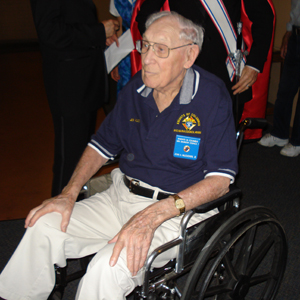
12/8/2010
The year 1933 saw the repeal of Prohibition in the United States, the continuation of the Great Depression, the start of construction on the Golden Gate Bridge, Adolph Hitler grabbing power in Germany, the premiere of King Kong, and FDR’s first fireside chat. Another item that occurred that year that you won’t find in history books, but that did lead to a lifetime of devoted fraternal service, was that John (Jack) A. McLoughlin Jr., a native of West Haven, Conn., became a member of San Salvador Council 1. That was the start of a remarkable 78 years of service to the Order until his passing on Dec. 3, 2010, at the age of 99.
Along with being a member of the Order, McLoughlin was an accountant at the Supreme Council office from 1941 until 1968 when he retired to take an administrative position at Quinnipiac College in Hamden, which was followed by a career at the Yale University Athletic Department. He served in the Coast Guard during World War II. He was predeceased by his wife Connie, and is survived by his three children and six grandchildren.
“Mr. McLoughlin’s experience stands as a true example of what it means to make membership in the Order an experience of a lifetime,” said Supreme Knight Carl A. Anderson. “His life also serves as an exemplary model of service to our Church and the community, something every Knight should strive toward.”
McLoughlin – who maintained his membership in Council 1 even after retiring to Arizona – was active with Ave Maria Council 9380 in Tucson, Ariz. Upon the occasion of his 75th anniversary as a Knight, the council (after finding that the years of active service pins did not go to that high of a level) had a pin especially designed for him.
“Jack moved to Tucson quite a few years ago, but kept his membership in San Salvador Council 1,” said former District Deputy Peter Karculias. “Up to the age of 95, Jack would be found out in front of the grocery store every year collecting money for people with intellectual disabilities campaign – all day long! Only when his health began to fail him and he had to use a wheelchair did he slow down. Still, he attended council functions as often as he could. His dedication and service to the Order and our Lord are an inspiration to us all.”
Tuesday, December 7, 2010
The Pope inaugurates Advent by recalling that an embryo is not an accumulation of biological material but a living being
From the L'Osservatore Romano,
On Saturday evening, 27 November, in St Peter's Basilica, the Holy Father presided at the celebration of First Vespers of the First Sunday of Advent, on which the Liturgical Year of the Church begins. This year the celebration was preceded by a half-hour Prayer Vigil for unborn life and by the exposition of the Blessed Sacrament. The celebration ended with the Pope's prayer for life and with adoration of the sacrament and the Eucharistic Blessing. The pro-life Prayer Vigil was organized by the Pontifical Council for the Family and similar vigils were celebrated on the same day in Catholic Churches across the world. The following is a translation of the Holy Father's Homily, which was given in Italian.
Dear Brothers and Sisters,With this evening celebration the Lord gives us the grace and joy of opening the new Liturgical Year, starting with its first season: Advent, the period that commemorates the coming of God among us. Every beginning brings a special grace, because it is blessed by the Lord.In this Advent Season we shall be granted once again to experience the closeness of the One who created the world, who guides history and who cared for us to the point of deigning to become a man. This great and fascinating mystery of the God-with-us, indeed, of the God who becomes one of us, is what we shall celebrate in the coming weeks journeying towards holy Christmas. During the Season of Advent we shall feel the Church which takes us by the hand and - in the image of Mary Most Holy, expresses her motherhood, enabling us to experience the joyful expectation of the coming of the Lord, who embraces us all in his love that saves and consoles.While our hearts look forward to the annual celebration of Christ's Birth, the Church's Liturgy directs our gaze to the final goal: our encounter with the Lord who will come in the splendour of glory. For this reason in every Eucharist we "announce his death, proclaim his Resurrection until he comes again", we watch in prayer. The Liturgy does not cease to encourage and support us, putting on our lips, in the days of Advent, the cry with which the whole of Sacred Scripture ends, on the last page of the Revelation to St John: "Come, Lord Jesus" (22:20).Dear brothers and sisters, our gathering this evening for the beginning of the journey through Advent is enriched by another important reason: together with the whole Church we wish to celebrate a solemn prayer vigil for unborn life. I would like to express my gratitude to all those who have accepted this invitation and to those who are specifically dedicated to welcoming and safeguarding human life in its various situations of frailty, especially when it is newly conceived and in its early stages. Precisely, the beginning of the Liturgical Year helps us live anew the expectation of God who took flesh in the womb of the Virgin Mary, God who makes himself little, who becomes a child; it speaks to us of the coming of a God who is close, who chose to experience human life from the very beginning in order to save it totally, in its fullness. And so the mystery of Lord's Incarnation and the beginning of human life are closely and harmoniously connected and in tune with each other in the one saving plan of God, the Lord of the life of each and everyone. The Incarnation reveals to us, with intense light and in a surprising way, that every human life has a very lofty and incomparable dignity.In comparison with all the other living beings that populate the earth man has an unmistakable originality. He is presented as the one unique being, endowed with intelligence and free will, as well as consisting of material reality. He lives simultaneously and inseparably in both the spiritual and the corporal dimension. This is also suggested in the text of the First Letter to the Thessalonians that has just been proclaimed: "May the God of peace himself", St Paul writes, "sanctify you wholly; and may your spirit and soul and body be kept sound and blameless for the coming of our Lord Jesus Christ" (5:23). We are therefore spirit, soul and body. We are part of this world, tied to the possibilities and limitations of our material condition, while at the same time we are open to an infinite horizon, able to converse with God and to welcome him within us. We are active in earthly realities and through them we are able to perceive God's presence and to reach out to him, Truth, Goodness and absolute Beauty. We savour fragments of life and happiness and yearn for complete fulfilment.God loves us deeply, totally and without making distinctions. He calls us to friendship with him, he makes us part of a reality beyond every imagination and every thought and word: his divine life itself. With feeling and gratitude, let us be aware of the value of every human person's incomparable dignity and of our great responsibility to all. "Christ, the final Adam", the Second Vatican Council states, "by the revelation of the mystery of the Father and his love, fully reveals man to man himself and makes his supreme calling clear… by his Incarnation, the Son of God has in a certain way united himself with each man". (Gaudium et Spes, n. 22).Believing in Jesus Christ also means seeing man in a new way, with trust and hope. Moreover, experience itself and right reason testify that the human being is capable of understanding and of wanting, conscious of himself and free, unrepeatable and irreplaceable, the summit of all earthly realities, and who demands to be recognized as a value in himself and deserves always to be accepted with respect and love. He is entitled not to be treated as an object to be possessed or a thing to be manipulated at will, and not to be exploited as a means for the benefit of others and their interests. The human person is a good in himself and his integral development must always be sought. Love for all, moreover, if it is sincere, tends spontaneously to become preferential attention to the weakest and poorest. This explains the Church's concern for the unborn, the frailest, those most threatened by the selfishness of adults and the clouding of consciences. The Church continually reasserts what the Second Vatican Council declared against abortion and against every violation of unborn life: "from the moment of its conception life must be guarded with the greatest care" (ibid., n. 51). Cultural trends exist that seek to anaesthetize consciences with spurious arguments. With regard to the embryo in the mother's womb, science itself highlights its autonomy, its capacity for interaction with the mother, the coordination of biological processes, the continuity of development, the growing complexity of the organism. It is not an accumulation of biological material but rather of a new living being, dynamic and marvelously ordered, a new individual of the human species. This is what Jesus was in Mary's womb; this is what we all were in our mother's womb. We may say with Tertullian, an ancient Christian writer: "the one who will be a man is one already" (Apologeticum IX, 8), there is no reason not to consider him a person from conception. Unfortunately, even after birth, the lives of children continue to be exposed to neglect, hunger, poverty, disease, abuse, violence and exploitation. The many violations of their rights sorrowfully wound the conscience of every person of good will. In the face of the sad view of injustices committed against human life, before and after birth, I make my own Pope John Paul II's passionate appeal to the responsibility of each and every individual: "respect, protect, love and serve life, every human life! Only in this direction will you find justice, development, true freedom, peace and happiness!" (Encyclical Evangelium vitae, n. 5). I urge politicians, leaders of the economy and of social communications to do everything in their power to promote a culture ever respectful of human life, to obtain favourable conditions and support networks for the acceptance and development of life. Let us entrust our prayers and our commitment to unborn life to the Virgin Mary, who welcomed the Son of God made man with her faith, with her maternal womb, with her attentive care, with her nurturing support, vibrant with love. Let us do so in the Liturgy - which is the place where we live the truth and where truth lives with us - adoring the divine Eucharist in which we contemplate Christ's Body, that Body which took flesh from Mary through the action of the Holy Spirit, and was born of her in Bethlehem for our salvation. Ave, verum Corpus, natum de Maria Virgine!
Wednesday, December 1, 2010
"Bishop Requests Novena for Seminarian Philip Johnson"
As we approach the Feast of the Immaculate Conception, Bishop Burbidge has requested that the entire Diocese of Raleigh participate in a novena for my healing through the intercession of Our Lady. Philip is a good friend of the council and of the parish. The novena will begin on November 29th, ending on Our Lady's Feast Day on December 8th.
Please pray for Philip!
The Novena is as follows:
Father all-powerful and ever-living God,
You chose the Immaculate Virgin Mary,
the mother of Your Son, to be the mother and help of all Christians.
As she endured her bitter agony at the cross of her Son,
she was consoled by You with the hope of His ressurection.
Now, in heaven she consoles with a mother's love all who turn to her with faith,
until the day of the Lord dawns in glory.
-Pray the Memorare-
Remember, O most gracious Virgin Mary,
That never was it known that anyone who fled to thy protection,
implored thy help or sought thy intercession,
was left unaided.
Inspired by this confidence,
I fly to thy, O Virgin of virgins, my mother;
to thee I come, before thee I stand, sinful and sorrowful.
O Mother of the Word Incarnate,
despise not my petitions,
but in thy mercy hear and answer me.
-We pray-
O Mother of the Word Incarnate,
we are filled with confidence that your prayers on our behalf
will be graciously heard before the throne of God.
Bring our seminarian, Philip Johnson healing, peace, courage, and strength
as he shares in the suffering of your Son.
O Glorious Mother of God,
in memory of your joyous Immaculate Conception,
hear our prayers and obtain for us our petitions.
Please pray for Philip!
The Novena is as follows:
Father all-powerful and ever-living God,
You chose the Immaculate Virgin Mary,
the mother of Your Son, to be the mother and help of all Christians.
As she endured her bitter agony at the cross of her Son,
she was consoled by You with the hope of His ressurection.
Now, in heaven she consoles with a mother's love all who turn to her with faith,
until the day of the Lord dawns in glory.
-Pray the Memorare-
Remember, O most gracious Virgin Mary,
That never was it known that anyone who fled to thy protection,
implored thy help or sought thy intercession,
was left unaided.
Inspired by this confidence,
I fly to thy, O Virgin of virgins, my mother;
to thee I come, before thee I stand, sinful and sorrowful.
O Mother of the Word Incarnate,
despise not my petitions,
but in thy mercy hear and answer me.
-We pray-
O Mother of the Word Incarnate,
we are filled with confidence that your prayers on our behalf
will be graciously heard before the throne of God.
Bring our seminarian, Philip Johnson healing, peace, courage, and strength
as he shares in the suffering of your Son.
O Glorious Mother of God,
in memory of your joyous Immaculate Conception,
hear our prayers and obtain for us our petitions.
Keep Christ in Christmas

In a time when all things religious are being discouraged and swept away, it’s refreshing to know that the Order sponsors the “Keep Christ in Christmas” campaign to remind people that Christmas is above all a holy day celebrating the birth of Christ. Keeping Christ in Christmas is keeping the very heart and meaning of the Christmas celebration alive. At Christmas we honor the birth of Jesus Christ. At times our Savior is forgotten in the commercialization of the season and the rush to get ready for holiday festivities. Each year the Knights of Columbus takes a leading role in reminding society that Christmas is first and foremost a holy day. One of the best ways to do this is participating in the Order’s “Keep Christ in Christmas” campaign. Here are some of the things we are doing:
•Urge all members to display a nativity scene on their property or at their place of business if they can.
•Resist the temptation, even when you’re in a rush or short of space, to abbreviate “Christmas” as “Xmas.” Reducing Christ to an “X” trivializes the message of the season.
The Best Presents Can’t Be Wrapped
This holiday season give the gift of yourself within your council, community and family. Give these or similar presents of friendship, understanding, kindness, love and compassion:
•Serve or prepare meals at a soup kitchen.
•Bring presents to children or elderly people in the hospital.
Clean, repair and refurbish a church in a poor neighborhood.
Visit someone who’s shut-in.
•Send a Christmas card to someone you have not seen or talked to in years.
Invite a friend or neighbor who will be alone to share your Christmas celebration.
•Reconcile with a friend or relative with whom you have quarreled. Apologize if you were wrong.
•Provide transportation to shelters for homeless people.
•Wish people you meet a good day and a happy and holy Christmas.
•Get the family together to clean out all the closets and dressers. Donate usable clothing, shoes, blankets and other items to a program for needy families.
•Send care packages to military personnel stationed overseas.
•Sing Christmas carols at nursing homes or hospitals.
•Collect baby clothes, blankets, food, diapers or money and donate these items to an organization that helps needy people.
•Supply car seats or cradles to underprivileged mothers.
•Sponsor a drive for children to donate their old toys to youngsters.
•Be a part of the holiday spirit by undertaking one or more of the items listed above and help make Christmas merry for someone else and yourself.
Remember to keep Christ in Christmas: See video below!
•Urge all members to display a nativity scene on their property or at their place of business if they can.
•Resist the temptation, even when you’re in a rush or short of space, to abbreviate “Christmas” as “Xmas.” Reducing Christ to an “X” trivializes the message of the season.
The Best Presents Can’t Be Wrapped
This holiday season give the gift of yourself within your council, community and family. Give these or similar presents of friendship, understanding, kindness, love and compassion:
•Serve or prepare meals at a soup kitchen.
•Bring presents to children or elderly people in the hospital.
Clean, repair and refurbish a church in a poor neighborhood.
Visit someone who’s shut-in.
•Send a Christmas card to someone you have not seen or talked to in years.
Invite a friend or neighbor who will be alone to share your Christmas celebration.
•Reconcile with a friend or relative with whom you have quarreled. Apologize if you were wrong.
•Provide transportation to shelters for homeless people.
•Wish people you meet a good day and a happy and holy Christmas.
•Get the family together to clean out all the closets and dressers. Donate usable clothing, shoes, blankets and other items to a program for needy families.
•Send care packages to military personnel stationed overseas.
•Sing Christmas carols at nursing homes or hospitals.
•Collect baby clothes, blankets, food, diapers or money and donate these items to an organization that helps needy people.
•Supply car seats or cradles to underprivileged mothers.
•Sponsor a drive for children to donate their old toys to youngsters.
•Be a part of the holiday spirit by undertaking one or more of the items listed above and help make Christmas merry for someone else and yourself.
Remember to keep Christ in Christmas: See video below!
Subscribe to:
Posts (Atom)
